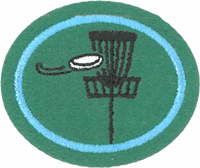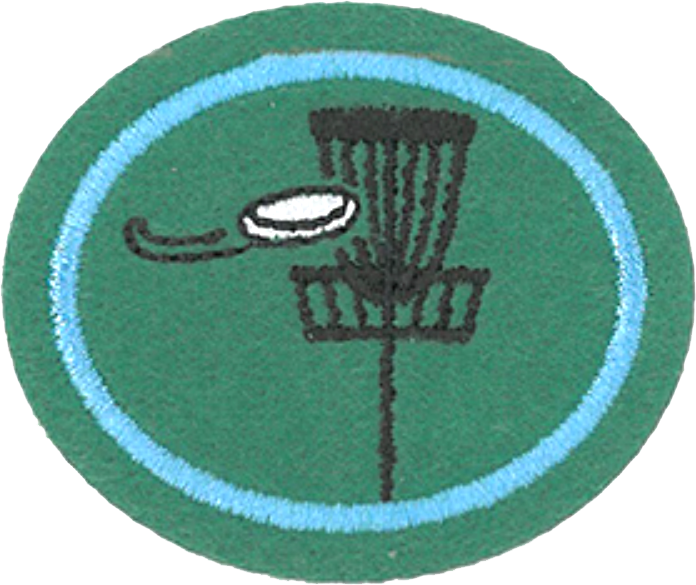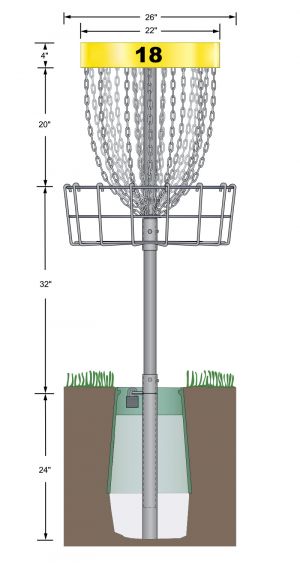AY Honor Disc Golf Answer Key
1
Disc golf is a flying disc sport in which players throw a disc at targets on a course which typically has 9 or 18 holes. The object of the game is to complete the course in the fewest throws of the disc.
Disc golf was first invented in the early 1900s. The first game was held in Bladworth, Saskatchewan, Canada in 1926. Ronald Brandon Cain and a group of his school buddies played a game of throwing tin lids into 4 foot wide circles drawn into sandy patches on their school grounds. They called the game Tin Lid Golf.
The "father" of the modern form of disc golf was Ed Headrick. He established the Disc Golf Association (DGA) in 1976.
Today there are over 13,000 disc golf courses installed throughout the world.
2
2a
The tee pad is the starting point for each hole. This flat surface may be constructed of cement, rubber, artificial turf, or dirt.
2b
A golf disc is like a Frisbee in the principles of flight although its smaller diameter, shallow depth, weight distribution, and edge design allow it to cut through the air more efficiently. When compared to a Frisbee, a golf disc travels faster and farther. You need at least one disc, but generally you should have at least one of each of the following: driver, mid-range, putter.
i
Used for the longest distance throws. Drivers are recognized by their sharp edge and have most of their mass concentrated on the outer rim of the disc rather than distributed equally throughout.
ii
Used for shorter distance throws. Mid-range discs feature a dull, rounded edge and a moderate rim width. They offer more control than drivers, but they have a smaller range.
iii
These discs are the most similar to a traditional Frisbee in both shape and flight. They typically have a round edge and are dome shaped. They fly at slower speeds, have a controllable straight flight, and are ideal for putting and accuracy shots around the green.
2c
Disc Catcher, Basket
3
3a
Speed ratings range from 1 to 14. Discs with a lower speed rating tend to be easier to throw, but might not go as far. If you're looking for more distance, speed ratings on the higher side of that range will accomplish that, but could be harder to throw.
3b
Glide ratings range from 1 to 7. Glide is the disc's ability to stay in the air as it flies toward the target.
3c
Turn ratings range from +1 to -5. Turn defines how much the disc turns to the right when first thrown for a right-hand player throwing backhand (RHBH). Discs with a score closer to -5 will have more turn.
3d
Fade ratings range from 0 to 5. Fade defines how much the disc turns to the left at the end of its flight for a right-hand player throwing backhand (RHBH). The higher the number, the stronger the fade.
3e
A disc that is stable will tend to have the straightest flight pattern.
3f
A disc that is over-stable will tend to track left for a right-hand player throwing backhand (RHBH).
3g
A disc that is under-stable will tend to track right for a right-hand player throwing backhand (RHBH).
4
5
A complete manual with the official rules of Disc Golf can be found at the Professional Disc Golf Association (PDGA) website.&
- Play begins at the throwing pad on hole 1.
- Throwing Order. Throwing order on the tee of the first hole is the order in which the players are listed on the scorecard. Throwing order on all subsequent tees is determined by the scores on the previous hole, so that the player with the lowest score throws first, and so on. Ties do not change the throwing order. After all players have a lie other than the teeing area, the player whose lie is farthest from the target is next in the throwing order.
- Completing a hole. A hole is completed when the disc rests in the catcher’s basket or is caught in the chains directly above the basket. If the disc lands on top of the basket the hole is not completed.
- After a hole is completed, proceed to the next hole.
- Repeat until all holes are completed.
- If a disc goes out of bounds or is lost during play, a penalty is applied by adding 1 to the number of throws. The player can throw again from the prior lie or from the spot where the disc went out of bounds.
- A hole may require a mandatory throw to the right or left of an obstacle (a "mando"). If you fail the mando you are required to add a penalty stroke to your score.
- Disc golf courses are normally laid out in and around wooded areas with diverse terrain to provide natural obstacles to the flight of the disc. The course must not be altered by the player in any way to decrease the difficulty of a hole. Players must play the course as they find it and play the disc where it lies.
6
7
There are several video tutorials you can find demonstrating how to properly master each throw and technique.
7a
7b
7c
7d
7e
7f
7g
8
One suggestion is to pair up with other players on the course. During the round be friendly and speak of your friendship with Jesus. Offer to pray before or after the round. Get your new friend's contact information so you can get together for another game.
Another suggestion is to hold a disc golf tournament for the community. Have a brief worship/prayer. Provide a gift bag of disc golf related goodies and include a small gospel tract.
Every time I am searching for a lost disc, I am reminded of God's call for me to search for lost souls.
Another suggestion is to pass tracts to different players at the course.
Invite a player or friend to join your Pathfinder club.
9
- Humility
- Patience
- Persistence
- Learning to play/live by the rules
10
References



